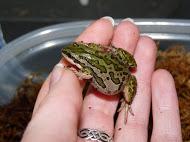Phenotypic plasticity in developmental rate is insufficient to offset high tadpole mortality in rapidly drying ponds
Abstract/Summary
Habitat suitability is strongly regulated by seasonal conditions and stochastic processes, and
this is especially important in temporary aquatic systems that contain organisms with complex life cycles.
We investigated the potential for phenotypic plasticity in timing of and size at metamorphosis to mitigate
effects of altered habitat conditions, specifically shortened hydroperiod (duration of water in ponds)
and altered predator-prey dynamics, in the pond-breeding boreal chorus frog (Pseudacris maculata). We
simulated reduced hydroperiod and concentrated predator cue in the laboratory to understand potential
benefits and costs of plasticity. Tadpoles developed faster in response to the combined effects of reduced
hydroperiod and increased concentration of predator cue, potentially due to reduced conspecific density.
In contrast, there was no effect of reduced hydroperiod or predator cue on size at metamorphosis. Alone,
this result suggests that phenotypic plasticity may allow P. maculata to escape the negative effects of rapidly
drying ponds. However, tadpole survival was significantly lower in reduced hydroperiod treatments
relative to all other treatments, suggesting that even if plasticity acts as a buffer against reduced hydroperiod
by facilitating metamorphosis, heightened mortality may offset benefits of this rapid response. Our
results add to previous studies of plastic responses in amphibians by disentangling the costs and benefits
of plasticity in habitats with multiple, simultaneous stressors. We show that while plasticity may accelerate
metamorphosis, similar, heightened levels of mortality are experienced regardless of plasticity. This
implies that plasticity may not completely buffer populations against the effects of altered habitat conditions,
such as those that occur with climate change or urbanization.
Publication details
| Published Date: | 2016-06 |
| Outlet/Publisher: | Ecosphere 2016, 00(00):e01386. 10.1002/ecs2.1386 |
| Media Format: |

